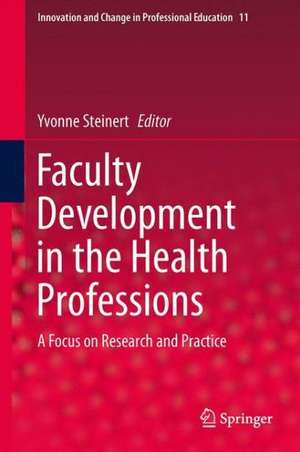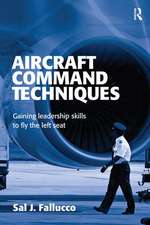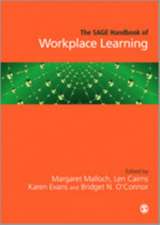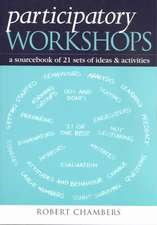Faculty Development in the Health Professions: A Focus on Research and Practice: Innovation and Change in Professional Education, cartea 11
Editat de Yvonne Steinerten Limba Engleză Hardback – 17 feb 2014
Kelley M. Skeff, M.D., Ph.D., May 2013:
In this text, Steinert and her colleagues have provided a significant contribution to the future of faculty development. In an academic and comprehensive way, the authors have both documented past efforts in faculty development as well as provided guidance and stimuli for the future. The scholarly and well-referenced chapters provide a compendium of methods previously used while emphasizing the expanding areas deserving work. Moreover, the writers consistently elucidate the faculty development process by highlighting the theoretical underpinnings of faculty development and the research conducted. Thus, the book provides an important resource for two major groups, current providers and researchers in faculty development as well as those desiring to enter the field. Both groups of readers can benefit from a reading of the entire book or by delving into their major area of interest and passion. In so doing, they will better understand our successes and our limitations in this emerging field. Faculty development in the health professions has now received attention for 6 decades.Yet, dedicated faculty members trying to address the challenges in medical education and the health care delivery system do not have all the assistance they need to achieve their goals. This book provides a valuable resource towards that end.
| Toate formatele și edițiile | Preț | Express |
|---|---|---|
| Paperback (1) | 1387.91 lei 6-8 săpt. | |
| SPRINGER NETHERLANDS – 18 sep 2016 | 1387.91 lei 6-8 săpt. | |
| Hardback (1) | 1334.36 lei 6-8 săpt. | |
| SPRINGER NETHERLANDS – 17 feb 2014 | 1334.36 lei 6-8 săpt. |
Din seria Innovation and Change in Professional Education
- 15%
 Preț: 634.49 lei
Preț: 634.49 lei -
 Preț: 358.27 lei
Preț: 358.27 lei - 24%
 Preț: 804.96 lei
Preț: 804.96 lei - 18%
 Preț: 947.18 lei
Preț: 947.18 lei - 24%
 Preț: 689.09 lei
Preț: 689.09 lei - 18%
 Preț: 898.58 lei
Preț: 898.58 lei - 18%
 Preț: 1014.76 lei
Preț: 1014.76 lei - 18%
 Preț: 948.29 lei
Preț: 948.29 lei -
 Preț: 391.02 lei
Preț: 391.02 lei - 15%
 Preț: 642.51 lei
Preț: 642.51 lei - 18%
 Preț: 1123.98 lei
Preț: 1123.98 lei - 15%
 Preț: 642.36 lei
Preț: 642.36 lei - 15%
 Preț: 634.32 lei
Preț: 634.32 lei - 15%
 Preț: 636.80 lei
Preț: 636.80 lei - 18%
 Preț: 778.13 lei
Preț: 778.13 lei - 15%
 Preț: 640.71 lei
Preț: 640.71 lei - 15%
 Preț: 639.73 lei
Preț: 639.73 lei -
 Preț: 378.64 lei
Preț: 378.64 lei
Preț: 1334.36 lei
Preț vechi: 1627.27 lei
-18% Nou
Puncte Express: 2002
Preț estimativ în valută:
255.32€ • 266.58$ • 211.32£
255.32€ • 266.58$ • 211.32£
Carte tipărită la comandă
Livrare economică 05-19 aprilie
Preluare comenzi: 021 569.72.76
Specificații
ISBN-13: 9789400776111
ISBN-10: 940077611X
Pagini: 460
Ilustrații: XVII, 442 p. 18 illus., 12 illus. in color.
Dimensiuni: 155 x 235 x 30 mm
Greutate: 0.82 kg
Ediția:2014
Editura: SPRINGER NETHERLANDS
Colecția Springer
Seria Innovation and Change in Professional Education
Locul publicării:Dordrecht, Netherlands
ISBN-10: 940077611X
Pagini: 460
Ilustrații: XVII, 442 p. 18 illus., 12 illus. in color.
Dimensiuni: 155 x 235 x 30 mm
Greutate: 0.82 kg
Ediția:2014
Editura: SPRINGER NETHERLANDS
Colecția Springer
Seria Innovation and Change in Professional Education
Locul publicării:Dordrecht, Netherlands
Public țintă
ResearchCuprins
Section I – Introduction.- 1. Faculty Development: Core Concepts and Principles; Yvonne Steinert.- Section II – The Scope of Faculty Development.- 2. Faculty Development for Teaching Improvement; Carol S. Hodgson and LuAnn Wilkerson.- 3. Faculty Development for Leadership and Management; Tim Swanwick and Judy McKimm.- 4. Faculty Development for Research Capacity Building; Brian Hodges.- 5. Faculty Development for Academic and Career Development; Karen Leslie.- 6. Faculty Development for Organizational Change; Brian Jolly.- Section III – Approaches to Faculty Development.- 7. Learning from Experience: From Workplace Learning to Communities of Practice; Yvonne Steinert.- 8. Peer Coaching and Mentorship; Miriam Boillat and Michelle Elizov.- 9. Workshops and Seminars: Enhancing Effectiveness; Willem de Grave, Anneke Zanting, Désirée D. Mansvelder-Longayroux and Willemina M. Molenaar.- 10. Intensive Longitudinal Faculty Development Programs; Larry Gruppen.- 11. Faculty Development Online; David A. Cook.- Section IV – Practical Applications.- 12. Faculty Development to Promote Role-Modeling and Reflective Practice; Karen V. Mann.- 13. Faculty Development for Curriculum Change: Towards Competency-Based Teaching and Assessment; Linda Snell.- 14. Faculty Development for Interprofessional Education and Practice; Liz Anderson, Sarah Hean, Cath O'Halloran, Richard Pitt and Marilyn Hammick.- 15. International Faculty Development Partnerships; Stacey Friedman, Francois Cilliers, Ara Tekian and John Norcini.- 16. Starting a Faculty Development Program; Ivan Silver.- Section V – Research and Scholarship in Faculty Development.- 17. Faculty Development Research: The ‘State of the Art’ and Future Trends; John Spencer.- 18. Promoting Scholarship in Faculty Development: Relevant Research Paradigms andMethodologies; Patricia S. O’Sullivan and David M. Irby.- 19. Faculty Development and Knowledge Translation: From Theory to Practice; Aliki Thomas and Yvonne Steinert.- Section VI – Conclusion.- 20. Faculty Development: Future Directions; Yvonne Steinert.
Recenzii
In this text, Steinert and her colleagues have provided a significant contribution to the future of faculty development. In an academic and comprehensive way, the authors have both documented past efforts in faculty development as well as provided guidance and stimuli for the future. The scholarly and well-referenced chapters provide a compendium of methods previously used while emphasizing the expanding areas deserving work. Moreover, the writers consistently elucidate the faculty development process by highlighting the theoretical underpinnings of faculty development and the research conducted. Thus, the book provides an important resource for two major groups, current providers and researchers in faculty development as well as those desiring to enter the field. Both groups of readers can benefit from a reading of the entire book or by delving into their major area of interest and passion. In so doing, they will better understand our successes and our limitations in this emerging field. Faculty development in the health professions has now received attention for 6 decades. Yet, dedicated faculty members trying to address the challenges in medical education and the health care delivery system do not have all the assistance they need to achieve their goals. This book provides a valuable resource towards that end.
Kelley M. Skeff, M.D., Ph.D., May 2013
This book is a must read for teachers, faculty developers, practitioners, and administrators who need to deal with developing, managing, and organizing effective staff development interventions. It provides cutting edge contributions about a wide range of faculty development issues. Yvonne Steinert has assembled a great collection of original chapters from authors who are well respected for their theoretical and research work. But maybe even more importantly, she had a keen eye for finding authors with outstanding practicalexperience. I am sure it will lead to a renewed recognition of the importance of faculty development. This is a highly informative guide for those involved in one of the most difficult practices of learning and training: Faculty Development in the Health Professions. We have been waiting a long time for such a book.
Wim Gijselaers, Professor, Maastricht University; Series Editor for Innovation and Change in Professional Education, July 2013
Kelley M. Skeff, M.D., Ph.D., May 2013
This book is a must read for teachers, faculty developers, practitioners, and administrators who need to deal with developing, managing, and organizing effective staff development interventions. It provides cutting edge contributions about a wide range of faculty development issues. Yvonne Steinert has assembled a great collection of original chapters from authors who are well respected for their theoretical and research work. But maybe even more importantly, she had a keen eye for finding authors with outstanding practicalexperience. I am sure it will lead to a renewed recognition of the importance of faculty development. This is a highly informative guide for those involved in one of the most difficult practices of learning and training: Faculty Development in the Health Professions. We have been waiting a long time for such a book.
Wim Gijselaers, Professor, Maastricht University; Series Editor for Innovation and Change in Professional Education, July 2013
Textul de pe ultima copertă
This volume addresses all facets of faculty development, including academic and career development, teaching improvement, research capacity building, and leadership development. In addition, it describes a multitude of ways, ranging from workshops to the workplace, in which health professionals can develop their knowledge and skills. By providing an informed and scholarly overview of faculty development, and by describing original content that has not been previously published, this book helps to ensure that research and evidence inform practice, move the scholarly agenda forward, and promote dialogue and debate in this evolving field. It will prove an invaluable resource for faculty development program planning, implementation and evaluation, and will help to sustain faculty members’ vitality and commitment to excellence.
Kelley M. Skeff, M.D., Ph.D., May 2013:
In this text, Steinert and her colleagues have provided a significant contribution to the future of faculty development. In an academic and comprehensive way, the authors have both documented past efforts in faculty development as well as provided guidance and stimuli for the future. The scholarly and well-referenced chapters provide a compendium of methods previously used while emphasizing the expanding areas deserving work. Moreover, the writers consistently elucidate the faculty development process by highlighting the theoretical underpinnings of faculty development and the research conducted. Thus, the book provides an important resource for two major groups, current providers and researchers in faculty development as well as those desiring to enter the field. Both groups of readers can benefit from a reading of the entire book or by delving into their major area of interest and passion. In so doing, they will better understand our successes and our limitations in this emerging field. Faculty development in the health professions has now receivedattention for 6 decades. Yet, dedicated faculty members trying to address the challenges in medical education and the health care delivery system do not have all the assistance they need to achieve their goals. This book provides a valuable resource towards that end.
Kelley M. Skeff, M.D., Ph.D., May 2013:
In this text, Steinert and her colleagues have provided a significant contribution to the future of faculty development. In an academic and comprehensive way, the authors have both documented past efforts in faculty development as well as provided guidance and stimuli for the future. The scholarly and well-referenced chapters provide a compendium of methods previously used while emphasizing the expanding areas deserving work. Moreover, the writers consistently elucidate the faculty development process by highlighting the theoretical underpinnings of faculty development and the research conducted. Thus, the book provides an important resource for two major groups, current providers and researchers in faculty development as well as those desiring to enter the field. Both groups of readers can benefit from a reading of the entire book or by delving into their major area of interest and passion. In so doing, they will better understand our successes and our limitations in this emerging field. Faculty development in the health professions has now receivedattention for 6 decades. Yet, dedicated faculty members trying to address the challenges in medical education and the health care delivery system do not have all the assistance they need to achieve their goals. This book provides a valuable resource towards that end.
Caracteristici
Is the first comprehensive review of faculty development in the health professions, filling a critical gap in the literature Takes a broad perspective on faculty development and addresses faculty members’ roles as teachers and educators, leaders and managers, and researchers and scholars Examines both research and practice, suggests new ways of helping faculty members to achieve their potential, and describes future directions and areas of inquiry Represents the collective efforts of an experienced team of international and interprofessional scholars and educators Includes supplementary material: sn.pub/extras











